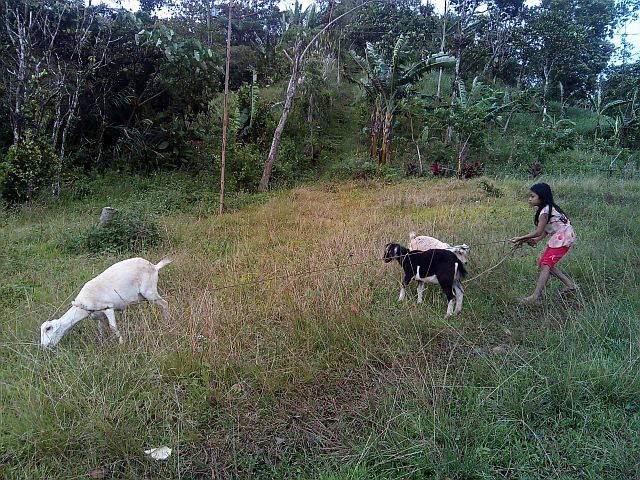
Cheryl makes sure that their goats are well fed. (PHOTO BY CRIS EVERT B. LATO)
Balamban, Cebu– Located 64 kilometers west of Cebu City, the town of Balamban is largely known as the shipbuilding capital of the Philippines.
But within its rugged mountain terrain and threatened forest cover lies a landmark about a painful episode in Philippine history.
In Mount Mununggal, within a village called Sunog (also known as Magsaysay), a monument marks the place where the Douglas C-47 aircraft carrying president Ramon Magsaysay and 24 other passengers crashed in 1957.
The area is still home to farming families who rely on their harvests for a living.
One of them is the Noya-Nacua family, whose home overlooks the camp site where mountaineers and visitors pitch their tents within the vicinity of the Magsaysay monument that pays tribute to the country’s seventh president.
“People do not realize that this is not public property because for so long… close to 60 years now, we have not imposed any entrance fees to anyone who come here,” said Rose Noya Nacua, one of the eight children of Francisco Noya.
Francisco is the son of Marcelino Noya, who was the first to discover the plane wreckage in his property back in 1957.
The account of her grandfather Marcelino, who died in 1992 at the age of 92, is still fresh in Rose’s mind.
Her father, Francisco, now in his 80s, also tells the story of how the family’s quiet life in the mountain was literally shaken by the explosion.
“It was a loud crash and in the darkness of the night, my grandfather checked the area where he heard a loud bang. He later heard a person calling out “Tao, tao…” It was the journalist Nestor Mata, the lone survivor of the crash,” Rose shared in Cebuano.
For his courage and bravery, Marcelino was recognized in Malacañang Palace almost six decades ago, along with his dog, Serging Avante.
According to Rose, politicians and other interested individuals offered to buy the medals her grandfather received when he was honored in Malacañang Palace.
But Marcelino refused.
“My grandfather would say that we are not after money because we can have it if we are hardworking. What we value the most is honor. Honor can never be taken away from us,” said Rose.
This is the value which she now imparts on her children.
Farming as a living
The Noya-Nacua family plants rootcrops, fruit trees, and vegetables.
They also raise chickens, goats, and pigs.
Rose’s husband, Paterno, is a security guard in Cebu City.
Their five children – Catherine (13), Marvin (11), Welvin (10), Cheryl (8), and Charlene (6) – like their parents, are hard workers who dutifully feed the pigs and bring the goats to graze in the field.
They also help their mother till the family farm.
A regular day at the Noya-Nacua home involves waking up as early as 5:00 a.m. to finish household chores before going to school in the village.
It is not uncommon to see Marvin climbing up the kalamansi tree or Catherine feeding the pigs.
Cheryl’s favorite chore is making sure that the goats are well fed.
A group of call center agents (right) stayed at Noya-Nacua property for an overnight camping. (PHOTO BY CRIS EVERT B. LATO)
Charlene, the youngest of the five children, helps out in cleaning the site and their house.
Welvin is the designated storekeeper of a small sari-sari store onsite which caters to the basic needs of campers.
The children have the entire camp as their playground.
“At home, I always emphasize the importance of Filipino values such as respecting the elders and greeting people ‘good morning’,” Rose said.
“I always remind my children that finishing school remains to be a priority. In school, you learn knowledge and skills,” she added.
Rose, now 42, has managed to complete a degree in elementary education and is now waiting for results of the Licensure Exam for Teachers.
Living in the vicinity of the camp site, Rose and her family have been responsible in maintaining the cleanliness of the area.
So when Rose decided to collect 20 pesos as an overnight fee for each person who stays in their property, there were several not-too-happy campers.
Unfortunately, many are not aware that the camp site is not government property.
Rose plans to work together with the barangay council so that an ordinance can be passed on the fees, recognizing the need to coordinate the matter with village officials.
As is the case in farming, where teamwork and cooperation are needed to ensure a good harvest, Rose said she will have to gather her siblings for a meeting.
“We thrive because we respect each other. Decisions are made by consulting each other… by making sure that we maintain our honor and dignity and not just because of money,” she said.